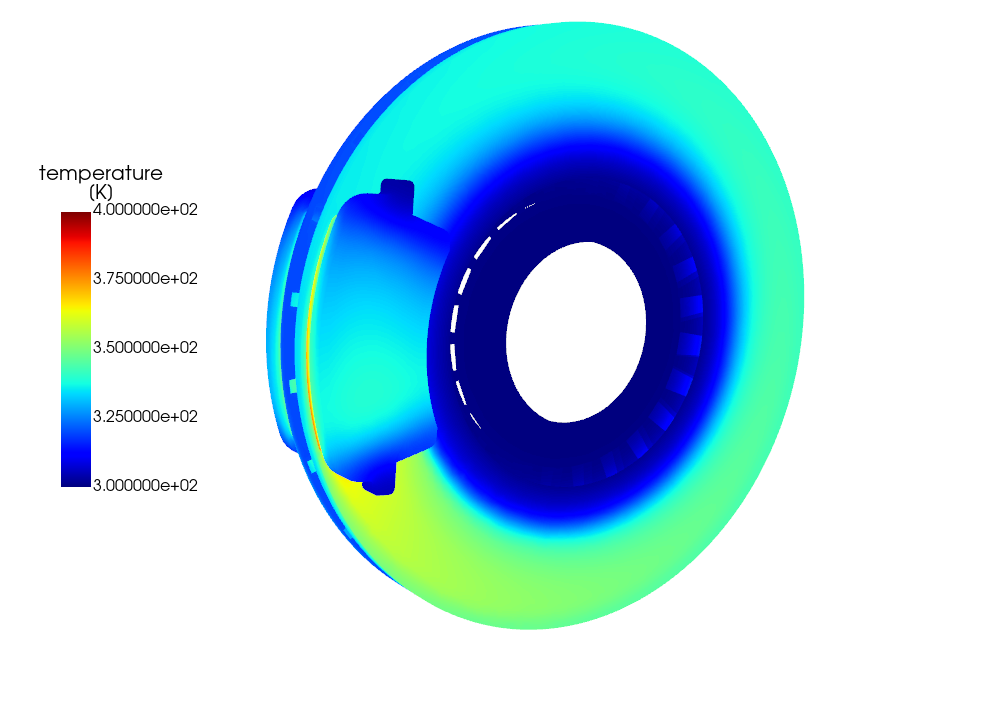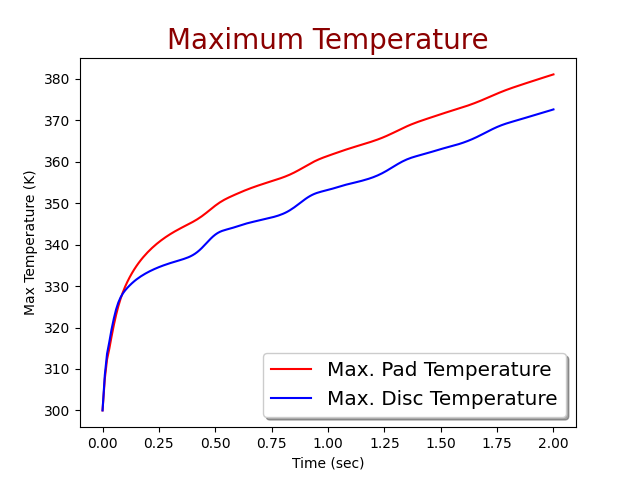Note
Go to the end to download the full example code
Automotive Brake Thermal Analysis#
Objective:#
Braking surfaces get heated due to frictional heating during braking. High temperature affects the braking performance and life of the braking system. This example demonstrates:
Fluent setup and simulation using PyFluent
Post processing using PyVista (3D Viewer) and Matplotlib (2D graphs)
Import required libraries/modules#
import csv
from pathlib import Path
import ansys.fluent.core as pyfluent
from ansys.fluent.core import examples
PyVista#
import ansys.fluent.visualization.pyvista as pv
Matplotlib#
import matplotlib.pyplot as plt
Specifying save path#
save_path can be specified as Path(“E:/”, “pyfluent-examples-tests”) or Path(“E:/pyfluent-examples-tests”) in a Windows machine for example, or Path(“~/pyfluent-examples-tests”) in Linux.
save_path = Path(pyfluent.EXAMPLES_PATH)
import_filename = examples.download_file(
"brake.msh",
"pyfluent/examples/Brake-Thermal-PyVista-Matplotlib",
save_path=save_path,
)
Fluent Solution Setup#
Launch Fluent session with solver mode#
session = pyfluent.launch_fluent(
mode="solver", show_gui=False, version="3ddp", precision="double", processor_count=2
)
session.check_health()
Import mesh#
session.tui.file.read_case(import_filename)
Define models and material#
session.tui.define.models.energy("yes", "no", "no", "no", "yes")
session.tui.define.models.unsteady_2nd_order_bounded("Yes")
session.tui.define.materials.copy("solid", "steel")
Solve only energy equation (conduction)#
session.tui.solve.set.equations("flow", "no", "kw", "no")
Define disc rotation#
(15.79 rps corresponds to 100 km/h car speed with 0.28 m of axis height from ground)
session.tui.define.boundary_conditions.set.solid(
"disc1",
"disc2",
"()",
"solid-motion?",
"yes",
"solid-omega",
"no",
-15.79,
"solid-x-origin",
"no",
-0.035,
"solid-y-origin",
"no",
-0.821,
"solid-z-origin",
"no",
0.045,
"solid-ai",
"no",
0,
"solid-aj",
"no",
1,
"solid-ak",
"no",
0,
"q",
)
Apply frictional heating on pad-disc surfaces#
Wall thickness 0f 2 mm has been assumed and 2e9 w/m3 is the heat generation which has been calculated from kinetic energy change due to braking.
session.tui.define.boundary_conditions.set.wall(
"wall_pad-disc1",
"wall-pad-disc2",
"()",
"wall-thickness",
0.002,
"q-dot",
"no",
2e9,
"q",
)
Apply convection cooling on outer surfaces due to air flow#
Outer surfaces are applied a constant htc of 100 W/(m2 K) and 300 K free stream temperature
session.tui.define.boundary_conditions.set.wall(
"wall-disc*",
"wall-geom*",
"()",
"thermal-bc",
"yes",
"convection",
"convective-heat-transfer-coefficient",
"no",
100,
"q",
)
Initialize#
Initialize with 300 K temperature
session.tui.solve.initialize.initialize_flow()
Post processing setup#
Report definitions and monitor plots
Set contour plot properties
Set views and camera
Set animation object
session.tui.solve.report_definitions.add(
"max-pad-temperature",
"volume-max",
"field",
"temperature",
"zone-names",
"geom-1-innerpad",
"geom-1-outerpad",
)
session.tui.solve.report_definitions.add(
"max-disc-temperature",
"volume-max",
"field",
"temperature",
"zone-names",
"disc1",
"disc2",
)
session.tui.solve.report_plots.add(
"max-temperature",
"report-defs",
"max-pad-temperature",
"max-disc-temperature",
"()",
)
report_file_path = Path(save_path) / "max-temperature.out"
session.tui.solve.report_files.add(
"max-temperature",
"report-defs",
"max-pad-temperature",
"max-disc-temperature",
"()",
"file-name",
str(report_file_path),
)
session.results.graphics.contour["contour-1"] = {
"boundary_values": True,
"color_map": {
"color": "field-velocity",
"font_automatic": True,
"font_name": "Helvetica",
"font_size": 0.032,
"format": "%0.2e",
"length": 0.54,
"log_scale": False,
"position": 1,
"show_all": True,
"size": 100,
"user_skip": 9,
"visible": True,
"width": 6.0,
},
"coloring": {"smooth": False},
"contour_lines": False,
"display_state_name": "None",
"draw_mesh": False,
"field": "temperature",
"filled": True,
"mesh_object": "",
"node_values": True,
"range_option": {"auto_range_on": {"global_range": True}},
}
session.tui.display.objects.create(
"contour",
"temperature",
"field",
"temperature",
"surface-list",
"wall*",
"()",
"color-map",
"format",
"%0.1f",
"q",
"range-option",
"auto-range-off",
"minimum",
300,
"maximum",
400,
"q",
"q",
)
session.tui.display.views.restore_view("top")
session.tui.display.views.camera.zoom_camera(2)
session.tui.display.views.save_view("animation-view")
session.tui.solve.animate.objects.create(
"animate-temperature",
"animate-on",
"temperature",
"frequency-of",
"flow-time",
"flow-time-frequency",
0.05,
"view",
"animation-view",
"q",
)
Run simulation#
Run simulation for 2 seconds flow time
Set time step size
Set number of time steps and maximum number of iterations per time step
session.tui.solve.set.transient_controls.time_step_size(0.01)
session.tui.solve.dual_time_iterate(200, 5)
Save simulation data#
Write case and data files
save_case_data_as = Path(save_path) / "brake-final.cas.h5"
session.tui.file.write_case_data(save_case_data_as)
Post processing with PyVista (3D visualization)#
Create a graphics session#
graphics_session1 = pv.Graphics(session)
Temperature contour object#
contour1 = graphics_session1.Contours["temperature"]
Check available options for contour object#
contour1()
Set contour properties#
contour1.field = "temperature"
contour1.surfaces_list = [
"wall-disc1",
"wall-disc2",
"wall-pad-disc2",
"wall_pad-disc1",
"wall-geom-1-bp_inner",
"wall-geom-1-bp_outer",
"wall-geom-1-innerpad",
"wall-geom-1-outerpad",
]
contour1.range.option = "auto-range-off"
contour1()
contour1.range.auto_range_off.minimum = 300
contour1.range.auto_range_off.maximum = 400
Display contour#
contour1.display()

Brake Surface Temperature
Post processing with Matplotlib (2D graph)#
Read monitor file#
X = []
Y = []
Z = []
i = -1
with open(report_file_path, "r") as datafile:
plotting = csv.reader(datafile, delimiter=" ")
for rows in plotting:
i = i + 1
if i > 2:
X.append(float(rows[3]))
Y.append(float(rows[2]))
Z.append(float(rows[1]))
Plot graph#
plt.title("Maximum Temperature", fontdict={"color": "darkred", "size": 20})
plt.plot(X, Z, label="Max. Pad Temperature", color="red")
plt.plot(X, Y, label="Max. Disc Temperature", color="blue")
plt.xlabel("Time (sec)")
plt.ylabel("Max Temperature (K)")
plt.legend(loc="lower right", shadow=True, fontsize="x-large")
Show graph#
plt.show()

Brake Maximum Temperature
Close the session#
session.exit()
# sphinx_gallery_thumbnail_path = '_static/brake_surface_temperature-thumbnail.png'
Total running time of the script: (0 minutes 0.000 seconds)